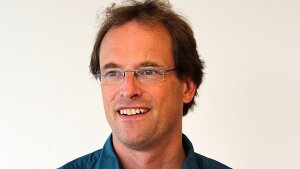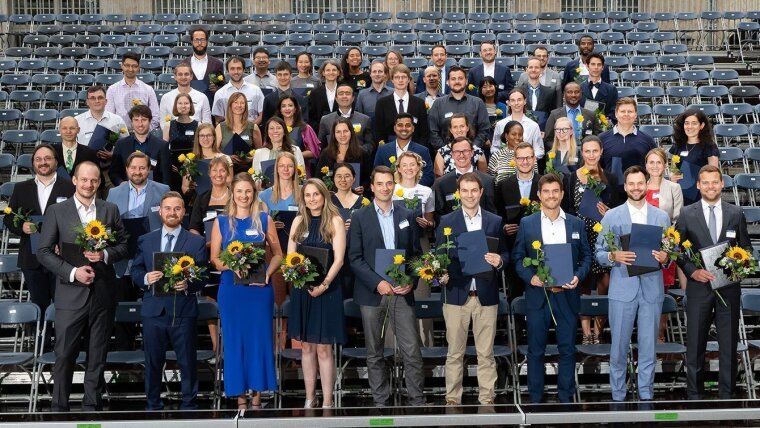
Event details
- Start
- End
- Types of event
- Festveranstaltung
- Venue
-
Universitätshauptgebäude
Fürstengraben 1, Aula
07743 Jena
Google Maps site planExternal link - Organized by
-
Graduierten-Akademie
- Contact
-
Judith Malsam
- Language of the event
- German
- Wheelchair access
- Yes
- Public
- Yes
At the graduation ceremony all doctoral graduates from the academic year 2022/23 are honoured and the doctoral and Rowena-Morse prizes are awarded. The event takes place in German.
Programme:
14h - Musical opening
Opening words
Prof. Dr. Walter Rosenthal, Präsident der FSU Jena
Keynote Lecture (in German)
"Wissenschaft am Beispiel der Klimaforschung: spannend und nützlich?"
(Climate research as an example of science: exciting and useful?)
Prof. Dr. Markus Reichstein
Musical Interlude
Presentation of the PhD certificates to new doctors of the participating faculties
Awards:
- Dissertation Awards of Jena University
- Rowena Morse Award of Jena University
Lecture by one of the laureates (in German)
Awarding the photo competition "Hats off!"
Music
16h Reception by the Lord Mayor of Jena
Keynote lecture: Wissenschaft am Beispiel der Klimaforschung: spannend und nützlich? (In German)
Prof. Dr. Markus Reichstein
Image: WikicommonsThe lecture will address the question of whether interesting science and social relevance are incompatible or mutually connected. To this end, the history of climate or earth system research will be examined in aspects and it will be shown that there are many aspects that are highly interesting scientifically and relevant to society at the same time. While other issues were initially driven by curiosity, they later turned out to be relevant. Last but not least, socially relevant challenges can lead to interesting scientific questions today, e.g. in the field of artificial intelligence.
Markus Reichstein is Director of the Department of Biogeochemical Integration at the Max Planck Institute for Biogeochemistry. His main research interests revolve around the reaction and feedback of ecosystems (vegetation and soils) to climate variability from an Earth system perspective. He was lead author of the IPCC Special Report on Climate Extremes (SREX), a member of the German Future Earth Committee on Sustainability Research and the Thuringian Climate Council. Recent awards include the Piers J. Sellers Mid-Career Award from the American Geophysical Union (2018), an ERC Synergy Grant (2019) and the Gottfried Wilhelm Leibniz Prize (2020).
Impressionen der Festveranstaltung am Schillertag 2023
-

Beginning of the festive ceremony on Schiller day
Image: Jens Meyer (University of Jena) -

Music during the festive ceremony
Image: Jens Meyer (University of Jena) -
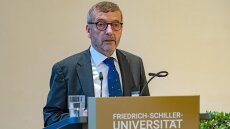
Opening words of the president of University of Jena, Prof. Dr. Walter Rosenthal
Image: Jens Meyer (University of Jena) -
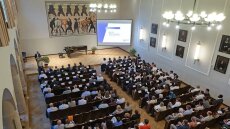
Opening words of the president of University of Jena, Prof. Dr. Walter Rosenthal
Image: Jens Meyer (University of Jena) -
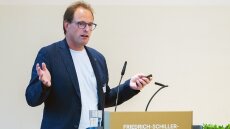
Keynote Lecture of Prof. Dr. Markus Reichstein
Image: Jens Meyer (University of Jena) -
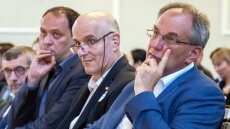
Audience during the keynote lecture of Prof. Dr. Markus Reichstein
Image: Jens Meyer (University of Jena) -

Keynote Lecture of Prof. Dr. Markus Reichstein
Image: Jens Meyer (University of Jena) -
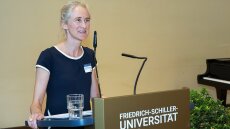
Honouring of the doctoral graduates by the Vice President for Learning and Teaching, Prof. Dr. Kim Siebenhüner
Image: Jens Meyer (University of Jena) -
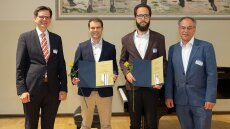
Doctoral graduates of Faculty of Theology
Image: Jens Meyer (University of Jena) -
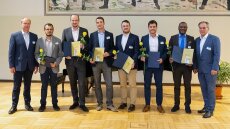
Doctoral graduates of Faculty of Economics and Business Administration
Image: Jens Meyer (University of Jena) -
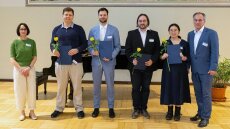
Doctoral Graduates of the Faculty of Arts and Humanities
Image: Jens Meyer (University of Jena) -
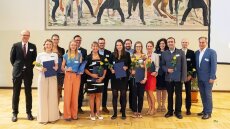
Doctoral Graduates of the Faculty of Social and Behavioural Sciences
Image: Jens Meyer (University of Jena)
